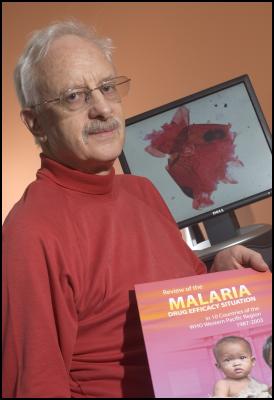Fake Drugs a Growing Problem in Southeast Asia
Fake Drugs a Growing Problem in Southeast Asia, Scientist Says

Click to enlarge
Dallas Mildenhall
NEWS
RELEASE from GNS Science
25 OCTOBER 2006
Fake Drugs a Growing Problem in Southeast Asia, Scientist Says
A New Zealand scientist is warning that the international trade in fake pharmaceuticals is getting bigger and could become a serious humanitarian problem, especially in some developing nations.
Sophisticated counterfeiting operations, based in Asia, are producing billions of fake pills for sale mostly in Asia and Africa. Some pills contain carcinogenic chemicals, solvents, and other harmful substances, but most deaths occur because they lack the active ingredients needed for treating illnesses such as malaria.
Dallas Mildenhall, a palynologist with GNS Science, has been working with Interpol for the past 18 months to track down illegal manufacturing plants in Asia.
The main drug being faked is the anti-malaria agent Artesunate, but it is likely a wide range of counterfeit drugs are being made and are finding their way into many countries, including New Zealand, via the internet.
Most of the drugs are being made in illicit operations in the border areas between China, Vietnam, Thailand, and Myanmar. Forensic analysis of fake tablets has resulted in two operations in China being shut down and arrests made. But other operations have evaded the surveillance and the flow of fake drugs continues.
” The counterfeiting is so good that it’s impossible to tell the fake pills and packaging apart from the genuine product, even with close visual inspection,” Dr Mildenhall said. “ Every security measure taken by the genuine manufacturers, such as holograms on the packaging and serial numbers on the blister packs, has been successfully copied by the counterfeiters.”
In 1995 Dr Mildenhall was asked to help with an Interpol operation because he is one of the world’s top forensic palynologists. Interpol is co-ordinating law enforcement operations, scientific analysis, and public health responses.
At his laboratory in Lower Hutt, Dr Mildenhall found the fake pills contained the pollen of about 30 species of trees and herbs that are found in certain areas along the Chinese-Vietnam border. This enabled Interpol to narrow their search. Other substances found in the pills were dust, animal and human hair, insect remains, charcoal, and carbon from motor vehicle exhaust.
“These fake drugs are causing thousands of deaths in Southeast Asia each year. They have started appearing in Africa, which is a bigger market and potentially more deadly. If they take hold in Africa, there will be a massive humanitarian problem.”
In Southeast Asia counterfeit drugs were typically sold alongside genuine drugs in places such as roadside stalls. Stall operators were not aware the products on their shelves were fake. They are less expensive than the genuine drugs and therefore more attractive to purchasers.
ENDS


 Maritime Union of New Zealand: Maritime Union Condemns Threatened Job Losses On Aratere Ferry
Maritime Union of New Zealand: Maritime Union Condemns Threatened Job Losses On Aratere Ferry Science Media Centre: Proposed Increase To Glyphosate Limits – Expert Reaction
Science Media Centre: Proposed Increase To Glyphosate Limits – Expert Reaction Electricity Authority: Welcomes Plan For Boosting Consumer-Supplied Flexibility
Electricity Authority: Welcomes Plan For Boosting Consumer-Supplied Flexibility University of Auckland: How Can Finance Be Harnessed For Good?
University of Auckland: How Can Finance Be Harnessed For Good? Michael Ryan, The Conversation: NZ Budget 2025 - Economic Forecasting Is Notoriously Difficult, But Global Uncertainty Is Making It Harder
Michael Ryan, The Conversation: NZ Budget 2025 - Economic Forecasting Is Notoriously Difficult, But Global Uncertainty Is Making It Harder KiwiRail: Aratere To Retire In August
KiwiRail: Aratere To Retire In August


